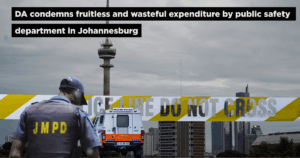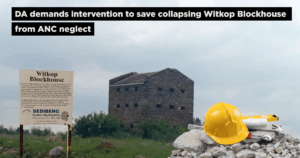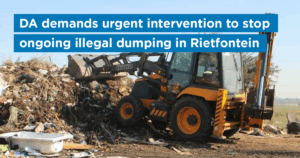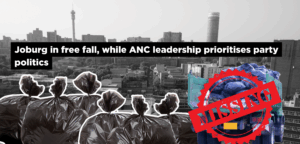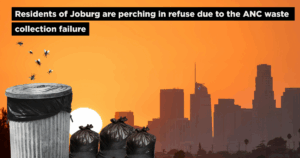The abject failure of the Gauteng government to implement its infrastructure plans is indicative of its inability to improve the lives of residents.
In 2017, at great cost to the fiscus, the Gauteng government produced a voluminous document called the Gauteng City Region Integrated Infrastructure Master Plan (GCRIIMP). The document analysed the status quo and deficit in terms of infrastructure in the province. Furthermore, it modelled future infrastructure needs and defined priority projects to fill the gaps.
The infrastructure analysis was done in several sectors, namely water, sanitation, electricity, solid waste, ICT, health infrastructure, educational infrastructure, and roads.
The priority projects proposed included:
• The creation of new wastewater treatment plants and bulk sewer capacity as part of the Sedibeng, Zuurbekom, and Lanseria Regional Sanitation Schemes.
• Creating an airport city as an element of the Aerotropolis.
• Gautrain phase two, the objectives of which were to purchase 12 additional train sets and to expand the existing network.
• Installation of solar PV panels on Gauteng buildings.
• Recommissioning of the Kelvin, Rooiwal, and Pretoria West Power Stations.
• Decentralising the Tambo Springs Freight and Logistics hub by building new roads and upgrading others.
• Create a mega human settlement in the West Rand in terms of the Masingita City Development Node.
• Trigeneration at hospitals, which uses technology to generate cooling, heating, and power.
• Implementation of an additional transmission powerline from the Matla to the Jupiter Power Stations.
• Building a new Lillian Ngoyi District hospital.
• Creation of the Kopanong Precinct, which involves the refurbishment of inner-city buildings in Johannesburg to house provincial officials.
• Social housing and mixed-use developments in the Lanseria area.
More than six years later, not a single project has come to fruition. No work has been done on most of the so-called priority projects.
There is absolute agreement that the government is not able to implement cost-efficient infrastructure and an acceptance that this will not change unless the private sector is involved both in terms of financing projects and contributing technical expertise.
The DA, in government, would make sure that this happens and that working with the government is an attractive option for the private sector.




